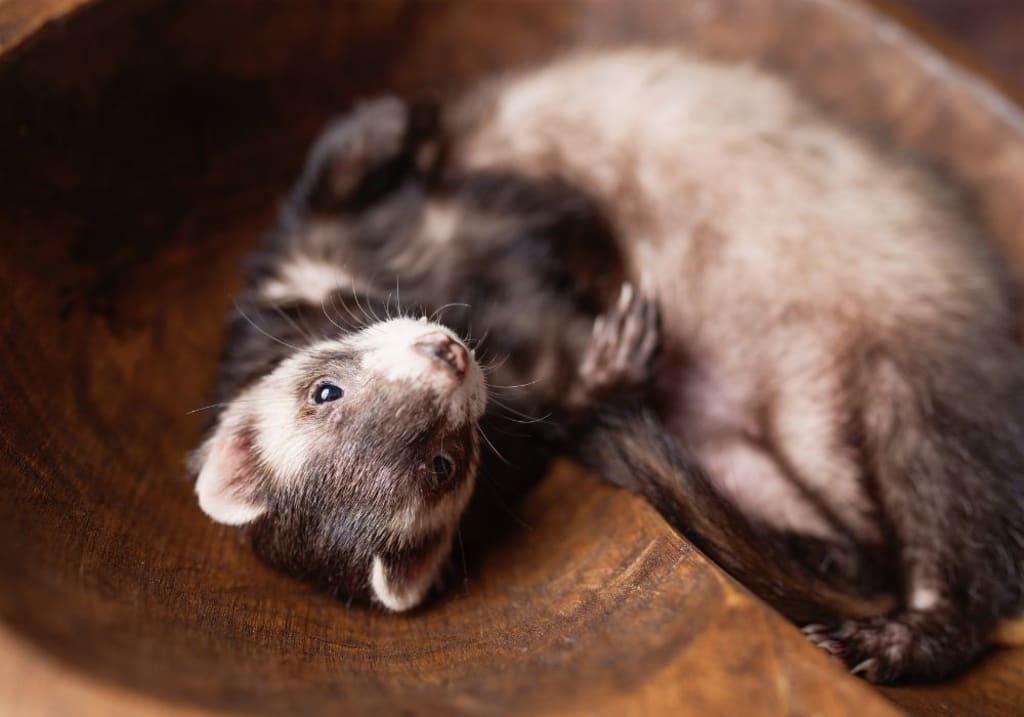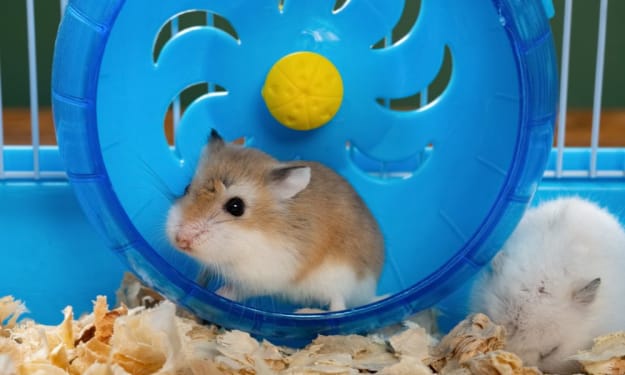Ferret-Safe Cleaning Products
Keeping Your Furry Friend Healthy and Happy

Ferrets are beloved pets known for their playful, curious nature. However, their inquisitive behavior can also put them at risk when it comes to household cleaning products. Many common cleaners contain harsh chemicals that can be toxic to ferrets if ingested or inhaled. As a responsible ferret owner, it's crucial to use only ferret-safe cleaning supplies to maintain a healthy and safe environment for your furry friend.
In this comprehensive guide, we'll explore the best cleaning products and methods to keep your ferret's habitat spotless without compromising their wellbeing. From daily maintenance to deep cleaning, we'll provide you with the knowledge and tools to ensure your ferret's living space is clean, fresh, and free from any potential hazards.
Understanding the Risks of Conventional Cleaning Products
Ferrets have a unique physiology that makes them particularly sensitive to certain chemicals and substances found in many household cleaners. Their small size and rapid metabolism mean that even small exposures can have serious consequences. Some of the most common dangers include:
- Respiratory Issues: Many cleaning products release fumes and volatile organic compounds (VOCs) that can irritate a ferret's delicate respiratory system, leading to coughing, wheezing, and even respiratory distress.
- Gastrointestinal Problems: Ferrets are natural foragers and may inadvertently ingest cleaning solutions or residues left on surfaces, causing vomiting, diarrhea, and other digestive issues.
- Skin Irritation: Some cleaners contain harsh ingredients that can cause skin irritation, rashes, or chemical burns if a ferret comes into direct contact with them.
- Neurological Damage: Certain chemicals found in cleaners, such as phenols and chlorine, can have toxic effects on a ferret's nervous system, leading to seizures, tremors, or even paralysis.
To protect your ferret's health and wellbeing, it's essential to choose cleaning products that are specifically formulated for use around pets, or to create your own homemade, ferret-safe solutions.
Identifying Ferret-Safe Cleaning Products
When selecting cleaning products for your ferret's habitat, look for the following key features:
- Natural, Non-Toxic Ingredients: Opt for cleaners that use plant-based, biodegradable ingredients rather than harsh chemicals. Avoid products containing bleach, ammonia, phenols, or other potentially toxic substances.
- Pet-Specific Formulations: Look for cleaning products that are explicitly labeled as safe for use around pets, especially ferrets. These formulas are designed to be non-irritating and non-toxic to animals.
- Fragrance-Free: Strong fragrances, even those labeled as "natural," can be overwhelming and potentially harmful to ferrets. Choose unscented or lightly scented products.
- Enzyme-Based Cleaners: Enzyme-based cleaners are particularly effective at breaking down organic matter, such as urine and feces, without the use of harsh chemicals.
- Approved by Veterinarians: When in doubt, consult with your ferret's veterinarian for recommendations on safe, effective cleaning products. Veterinary-approved products are a reliable choice.
By selecting cleaning supplies that meet these criteria, you can ensure your ferret's habitat is thoroughly cleaned without exposing them to any potential health risks.
Homemade Ferret-Safe Cleaning Solutions
In addition to commercially available ferret-safe cleaning products, you can also create your own effective, non-toxic solutions at home using common household ingredients. Here are some easy-to-make recipes:
All-Purpose Cleaner:
- 1 cup water
- 1/4 cup white vinegar
- 10-15 drops of essential oils (such as lemon, lavender, or tea tree oil)
- Mix the ingredients in a spray bottle and use to clean surfaces.
Disinfecting Cleaner:
- 1 cup water
- 1/4 cup hydrogen peroxide
- 1 tablespoon baking soda
- Combine the ingredients in a spray bottle and use to disinfect and deodorize.
Stain and Odor Remover:
- 1 cup water
- 1/4 cup white vinegar
- 1 tablespoon enzyme-based pet cleaner
- Mix the ingredients in a spray bottle and use to remove stubborn stains and odors.
Litter Box Deodorizer:
- 1 cup baking soda
- 10-15 drops of essential oils (such as lavender or peppermint)
- Sprinkle the mixture over the litter to help absorb odors.
When using homemade cleaners, always test them on a small, inconspicuous area first to ensure they don't damage surfaces or cause any adverse reactions for your ferret. Additionally, be sure to thoroughly rinse and dry all cleaned surfaces before allowing your ferret back into the area.
Proper Cleaning Techniques for Ferret Habitats
Maintaining a clean and healthy environment for your ferret requires a consistent cleaning routine. Here are some best practices to follow:
Daily Cleaning:
- Scoop the litter box at least once a day, or more frequently if needed.
- Wipe down food and water bowls, and refill with fresh water.
- Spot clean any visible soiled areas on the cage floor or furnishings.
Weekly Cleaning:
- Remove all bedding and thoroughly clean the cage with a ferret-safe cleaner.
- Wash all toys, hammocks, and other accessories in hot, soapy water.
- Disinfect the cage using a diluted bleach solution (1 part bleach to 10 parts water) or a pet-safe disinfectant.
Deep Cleaning:
- Completely empty the cage and wash all components, including the base, shelves, and ramps.
- Vacuum or sweep the area around the cage to remove any loose hair, litter, or debris.
- Wipe down the surrounding walls and surfaces to maintain a clean, odor-free environment.
Remember to always remove your ferret from the habitat during the cleaning process and provide them with a safe, secure space to play and rest. Proper ventilation is also crucial to allow any cleaning product fumes to dissipate before reintroducing your ferret.
Maintaining a Healthy, Odor-Free Ferret Habitat
In addition to using ferret-safe cleaning products and techniques, there are several other steps you can take to keep your ferret's living space clean, fresh, and free from unpleasant odors:
- Provide Adequate Litter: Choose a high-quality, absorbent litter that is specifically designed for ferrets. Avoid clumping cat litters, as they can be harmful if ingested.
- Rotate Bedding: Regularly replace the bedding in your ferret's sleeping areas to prevent the buildup of odors and bacteria. Opt for natural, absorbent materials like fleece or paper-based bedding.
- Groom Regularly: Brush your ferret's coat and trim their nails on a regular basis to minimize the amount of loose hair and dander in their habitat.
- Use Air Purifiers: Consider investing in an air purifier with a HEPA filter to help remove airborne allergens, dust, and odors from your ferret's living space.
- Maintain Proper Ventilation: Ensure your ferret's habitat is located in a well-ventilated area and avoid placing the cage in enclosed spaces, such as closets or bathrooms.
By combining the use of ferret-safe cleaning products with these additional maintenance strategies, you can create a clean, healthy, and odor-free environment for your beloved ferret to thrive.
Conclusion
Keeping your ferret's habitat clean and safe is a crucial aspect of responsible pet ownership. By choosing ferret-safe cleaning products, either commercially available or homemade, you can effectively maintain a spotless living space without exposing your furry friend to harmful chemicals or toxins.
Remember to always prioritize your ferret's health and wellbeing when selecting cleaning supplies and methods. With the right knowledge and tools, you can ensure your ferret's habitat is a clean, fresh, and safe haven for them to play, explore, and live their best life.
About the Creator
Hasan
Welcome...
In this site of mine you can learn amazing things and many information that you don't know so please subscribe to my site.
Enjoyed the story? Support the Creator.
Subscribe for free to receive all their stories in your feed.






Comments
There are no comments for this story
Be the first to respond and start the conversation.